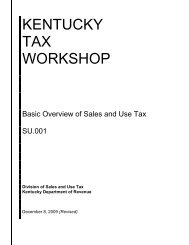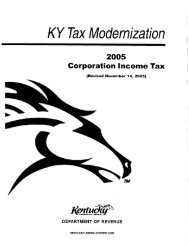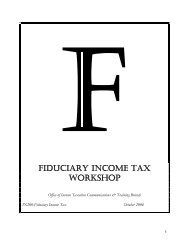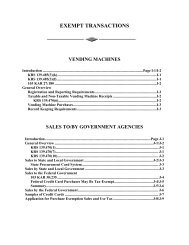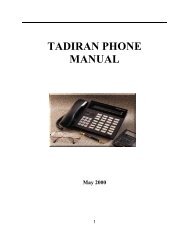administration & accounting - Kentucky: Revenue Employee Website
administration & accounting - Kentucky: Revenue Employee Website
administration & accounting - Kentucky: Revenue Employee Website
You also want an ePaper? Increase the reach of your titles
YUMPU automatically turns print PDFs into web optimized ePapers that Google loves.
manner/purpose that makes the sale exempt from tax.” For example, one of the certificates,<br />
purporting to rely upon the exemption for machinery for new and expanded industry, stated that<br />
the machinery or equipment in question was going to West Virginia for installation, a<br />
circumstance that on its face precluded the application of that exemption. See <strong>Kentucky</strong><br />
Administrative Regulation 103 KAR 30:120§1(4). A seller that accepts an incomplete<br />
certificate or an obviously invalid certificate is not entitled to protection from sales tax liability,<br />
the KBTA ruled.<br />
AUDIT PROCEDURE - VENDOR<br />
Verify Deductions Taken are Substantiated by Certificates of Exemption<br />
Sales invoices should be examined to determine that the claimed amounts are included in total<br />
sales and that the correct amounts have been scheduled. Verify that the deduction on the return is<br />
correct by ensuring that amounts claimed do not include nontaxable items such as labor that<br />
should be claimed under some other classification, and that no part of the invoice represents a<br />
taxable sale.<br />
If the taxpayer cannot support the claimed deduction, then such deduction must be disallowed.<br />
Verify Acceptability of Documentary Evidence Supporting Deduction - Good Faith<br />
All claimed sales deemed exempt by virtue of being supported by a certificate of exemption will<br />
be allowed if such certificate is proper in form and taken in good faith from the purchaser at the<br />
time of sale. “Good faith” is defined as accepting a signed certificate and maintaining a file of<br />
those certificates. If a vendor has a certificate on file that is entirely complete, signed and dated<br />
and the property being purchased applies to the purchaser's type of business, then such certificate<br />
will be honored.<br />
Prior to 7/1/04, the law defined good faith for the acceptance of certificates of exemption<br />
differently from that for the acceptance of resale certificates but effective 7/1/04, both resale and<br />
exemption certificates are treated substantially the same.<br />
Many occasions exist when the retailers fail to obtain the proper certificate at the time of making<br />
the sale. In an attempt to administer the sales and use tax law in a fair manner and to collect only<br />
those taxes due, the Department has permitted the taxpayer a grace period in which it can obtain<br />
certificates after the audit process begins. However, it must be understood that exemption<br />
certificates obtained during this grace period have not been accepted in “Good faith” as required<br />
by KRS 139.490 and KRS 139.270. Accordingly, such certificates are subject to more scrutiny<br />
than those certificates obtained at the time of sale and retained on file.<br />
Certificates of Exemption obtained by a retailer after audit for items which are clearly taxable<br />
(no exemption exist) are not valid and do not relieve the retailer from the tax liability. A seller<br />
that fails to obtain the certificate at the time of sale has failed to show good faith by obtaining the<br />
required certificate and maintaining the file as required by KRS 139.490 and KRS 139.270.<br />
R - 4




